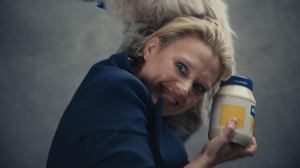Millions of people around the world struggle with eating disorders, but few open up as much about it and in such a personal way as Jennette McCurdy recently did, and it’s something everyone should read. Many will know McCurdy from her hit Nickelodeon shows iCarly and Sam & Cat, but what you might not know is that all throughout those hit shows she was struggling with not only anorexia but later bulimia, and in her recent piece for Huffington Post she talks about what led to her struggles with those eating disorders, what happened during that struggle, and how she found recovery.
McCurdy starts off by explaining why she initially hesitated on opening up about this sensitive issue. “But now I’ve been in recovery maintenance for two years,” McCurdy said. “I’m no longer actively engaging in disordered eating. After spending a lot of time in therapy working on myself and confronting what I’ve experienced, I finally feel like I have the perspective required to write about what I’ve been through and maybe ― hopefully ― it might help someone who is going through the same thing feel less alone. (Plus, it’s been a good few years since mom died, so my quota for trauma sharing is ready to be refilled.)”
Videos by ComicBook.com
She recalls that her mother also dealt with anorexia, which most likely informed her issues with Jennette’s weight, always comparing her to other girls, portioning out meals for her, and counting her calories. One moment in particular though changed her outlook, where her mom brought up the concerns of other moms about Jennette possibly being too skinny only to tell Jennette “if anybody asks, just tell them you’re eating normally”.
“In retrospect, that moment alone should have been alarming enough to make me question mom’s support,” McCurdy said. “But even if I had wanted to stop at that point, I don’t think I could have. I was already too controlled by my eating disorder to see clearly what was happening to me. Plus, being small was doing wonders for my career. I booked six roles that year, all for characters several years younger than I was. I made justifications for my mom’s support of my disordered eating and I made justifications for my continuing down the road I was traveling.”
Things got even more chaotic though when she got iCarly. “At 14, I was cast in the Nickelodeon series “iCarly,” and by the time I was 15, the show was starting to get popular,” McCurdy said. “The stress of having to be “on” all the time got to me. I became even more fixated on food and my body. I monitored every bite I took. I exercised obsessively. I measured my thighs with a measuring tape every night before bed.”
After a few years though, the everyday stress and her mother’s failing health caused her to go from anorexia to bulimia.
“When I was 18, my mom was diagnosed with cancer for a second time and this time it was terminal,” McCurdy said. “iCarly” had become a global phenomenon, I had a record deal with a fancy record label, mom was dying, and I just couldn’t handle the pressures of everything happening around me. But this time, instead of turning away from food, I turned to food. Lots and lots of food.”
“But this time it was a bit different,” McCurdy said. “Every day I’d try not to eat ― I’d give it my best shot, I really would ― but eventually, my mind and body would cave in and demand food. I would eat … and then I would throw up what I ate.”
“This hellish bulimic spiral continued for three more years,” McCurdy said. “And during those years ― plus the 10 years before when I was wrapped up in other forms of disordered eating ― not one person in the entertainment industry confronted me about it. Maybe my destructive behavior was obvious to everyone around me, but if they were all monetizing the situation ― and essentially me ― then what incentive did they have to try to change it or help me?”
McCurdy eventually sought out some help after her sister confronted her, and started to meet with a therapist named Laura. She would meet with Laura for sessions but also took her to high-stress events, like the 2015 Kids Choice Awards.
“Laura was my plus-one to the 2015 Kids’ Choice Awards,” McCurdy said. “Nick Jonas called me to the stage, I locked eyes with a clapping Angelina Jolie, and I got through my lines. Then I walked backstage to meet up with Laura, who was trying to be discreet about taking a picture of Adam Sandler (she wasn’t very familiar with his films but loved “The Chanukah Song”). She beamed at me as I scarfed down a few sliders. Then she quickly sensed my inner turmoil. We rushed to the backseat of an Uber XL where I began sobbing as Laura made sure that I didn’t throw up. The Uber driver was very confused as I repeatedly wailed, “The sliiiiiiiders!”
It took a while after that to seek other help, but she eventually did with an eating disorder specialist Hank. Hank’s style was the opposite of Laura’s but it was what she needed at the time, as he would call out things that weren’t logical, calling it her “eating disorder voice”.
“Identifying my eating disorder voice was the most pivotal aspect of my recovery,” McCurdy said. “I had to learn to understand this thing in and out. I had to recognize that this part of my mind, this eating disorder voice, was not healthy and was not going away. So if I wanted to get better, I’d have to call out my eating disorder voice every single time it popped up. I’d have to confront my urges to obsess or indulge in disordered eating behaviors (which arose hundreds of times every day), work to avoid or correct them, and act based on my recently adopted healthy mindset instead.”
“Recovery was brutal,” McCurdy said. “It felt like breaking up with a bad boyfriend whom I loved even though I knew I shouldn’t. He treated me poorly, he ruined my life, he consistently devastated me, and yet, without him, who was I really?”
“I had several relapses during my time with Hank and several more even after I finished the program, but Hank warned me about relapses and told me they were totally normal,” McCurdy said. The important thing was getting back on the recovery program anytime I had a slip so that, as they say in recovery, ‘the slip doesn’t become a slide.’”
We definitely recommend reading McCurdy’s full piece, and if you want to learn more about eating disorders and how to help, you can check out NationalEatingDisorders.org right here.




